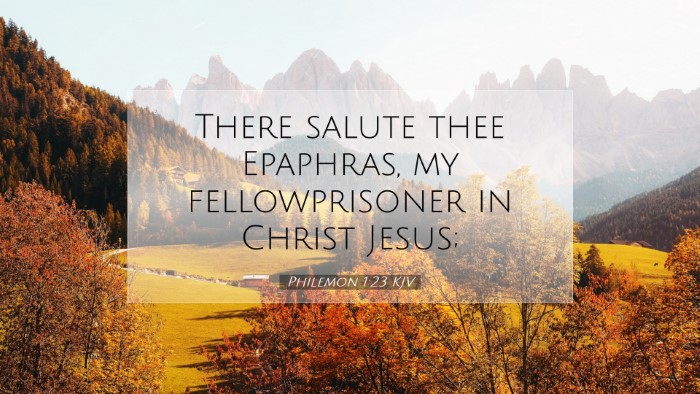Commentary on Philemon 1:23
Philemon 1:23 reads:
"Epaphras, my fellow prisoner in Christ Jesus, greets you."
This brief verse encapsulates significant themes of fellowship, imprisonment, and mutual support within the Christian community. The insights drawn from various public domain commentaries illuminate the depth of meaning embedded in this passage.
Overview and Context
The Epistle to Philemon is a personal letter from the Apostle Paul to a wealthy Christian slave owner, Philemon. It addresses the return of Onesimus, Philemon’s runaway slave, who had found faith in Christ under Paul's ministry. This letter not only addresses issues of slavery and Christian ethics but also emphasizes the bonds of brotherhood and community prevalent among early Christians.
Insights from Matthew Henry
Matthew Henry observes that the mention of Epaphras as a "fellow prisoner" indicates a profound shared experience in suffering for the sake of Christ. Henry emphasizes:
- The importance of Christian fellowship during trials.
- The idea that true Christian service often involves sacrifice and hardship.
He highlights Epaphras’ imprisonment as a testament to his commitment to the Gospel and suggests that such relationships foster a deeper sense of community and mutual encouragement among believers.
Reflections from Albert Barnes
Albert Barnes provides a detailed analysis of the phrase "fellow prisoner." He notes:
- Epaphras' imprisonment symbolizes solidarity in Christ's work.
- The term indicates a strong bond forged through shared faith and experiences of suffering.
Barnes points out that this partnership in hardship underscores the nature of Christian relationships, where believers support one another spiritually and practically. He also mentions that Epaphras’ greeting serves as an encouragement to Philemon, reminding him that he is not alone in his trials.
Commentary from Adam Clarke
Adam Clarke elaborates on the character of Epaphras, noting his significance in the early church. Clarke asserts:
- Epaphras might have been a pastor or leader associated with the Colossian church.
- His imprisonment suggests that he was actively engaged in evangelism and biblical ministry, warranting his confinement.
Clarke further highlights that the reference to Epaphras’ greeting is not just formalism; it represents a heartfelt connection and community prayers. The implication is that the Christian community is intricately linked, and each member's struggles contribute to the greater narrative of faith.
Theological Implications
The verse prompts deep theological reflections on the nature of Christian fellowship. The notion of being a "fellow prisoner" exposes several critical themes:
- Shared Suffering: The call to suffer for Christ is often accompanied by the promise of solidarity among believers.
- Community Dynamics: The interconnectedness of Christians implies that no one bears their burdens alone.
- Impact of Ministry: The cost of evangelism and discipleship can lead to persecution, yet such experiences can strengthen bonds within the community of faith.
Practical Applications
This verse invites several practical applications for contemporary believers:
- Encouragement in Trials: Just as Paul exhorts Philemon through the greeting of Epaphras, today’s believers are called to encourage one another amidst adversities.
- Embrace of Community: The letter emphasizes the importance of maintaining connections with others in faith, promoting a spirit of unity and support.
- Active Witness: The example of Epaphras challenges current believers to engage in active ministry, even under difficult circumstances.
Conclusion
Philemon 1:23, though succinct, encapsulates vital facets of Christian living. Through the collective insights of Matthew Henry, Albert Barnes, and Adam Clarke, we recognize the importance of mutual support within the Body of Christ, the significance of shared experiences in faith, and the call to remain steadfast in ministry despite trials. As pastors, students, theologians, and scholars reflect on this verse, the underlying message of fellowship, solidarity, and encouragement in the faith journey resonates powerfully within today’s Christian landscape.


